David Haye officially announced his retirement from boxing yesterday, just over a month removed from an emphatic TKO loss in his rematch with Tony Bellew.
In a 2000 word statement published on his website, Haye, who has struggled with a string of injuries within the last five years, conceded that his 37-year-old-body could no longer respond to the physical demands of boxing at a world-class level.
It marks the end of a highly successful career which saw the Bermondsey man become a unified world champion at cruiserweight before moving up to capture a world title at heavyweight.
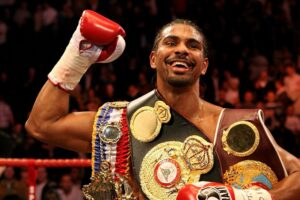
Haye made an estimated £30 million from his heavyweight fights alone, in addition to securing a range of lucrative sponsorship deals during his career. He successfully branched into boxing promotion while still an active fighter, founding Hayemaker Promotions, now combined with Ringstar Sport under the label of Hayemaker Ringstar, which handles the professional career, among others, of 2016 Olympic Silver Medallist Joe Joyce.
After turning professional in 2002 on the back of a successful amateur career – which saw him win a silver medal for England at the 2001 World Boxing Championships – Haye was seemingly tailor-made for stardom in the paid ranks.
Blessed with speed, power, good looks and charisma, he would transform himself not just into a two-weight World champion, but one of the most recognisable and popular fighters in British boxing; and certainly one of the most exciting to watch.
Explosive power would become Haye’s calling card – 26 of his 28 career victories came inside the distance for an eye-popping 93% KO percentage – and accounted for many of his finest moments.
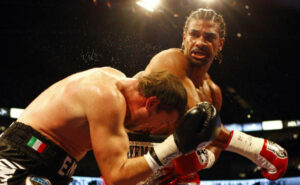
Overcoming exhaustion and a terrible cut to capture the European cruiserweight title old amateur foe Giacobbe Fragomeni; recovering from a fourth round knockdown to blast out Jean-Marc Mormeck and win the cruiserweight belts in 2007; unifying titles against Enzo Maccarinelli with a sensational second round stoppage, and – in his final marquee victory – taking out an iron-chinned Dereck Chisora in the fifth round of their 2012 grudge match.
Haye’s much-vaunted power would leave a mark on fans – and opponents alike – with a series of highlight-reel stoppages.
In contrast, his heavyweight World title win against lumbering seven foot Russian giant, Nikolay Valuev, was a dreary tactical affair which went the full distance. The victory did, however, make him only the second man in boxing history after Evander Holyfield to win world titles at cruiserweight and heavyweight.
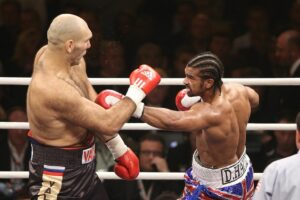
There have been low points; an upset first-career-loss by TKO at the hands of crafty veteran Carl Thompson, being outclassed by Wladimir Klitschko in their heavyweight unification fight (earning the ridicule of fans by blaming his subpar performance on a broken little toe) before ending his career in acrimonious circumstances with two stoppage defeats against bitter rival Tony Bellew.
His decision to wear a t-shirt depicting him holding the severed heads of the Klitschko brothers in the build-up to his fight with Wladimir was in poor taste. His prediction that his fight with Audley Harrison would be as ‘one-sided as a gang-rape’ was outright offensive. His Munich brawl with Dereck Chisora was an embarrassment for both and to British boxing.
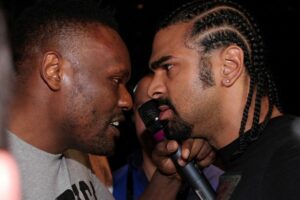
Haye is nothing if not a showman, and while his penchant for bluster and trash-talking may have helped to raise his public profile and sell fights: it has not always portrayed him in the best of light.
There is another side to David Haye which better captures his essence as a person; intelligent, articulate, genial and generous in equal measure.
Haye has a reputation for making time for his fans and for being engaging and friendly around them. He has supported a staggering range of charitable causes, from animal rights to raising awareness of prostate cancer and empowering disadvantaged young people.
@mrdavidhaye Thank you so much for taking the time for a selfie today, you’ve gained 2 new fans! #gentleman #bringontherematch 🥊🥊🥊 pic.twitter.com/JczERrseZo
— Jenny Sawley (@Jenny3260) March 21, 2018
This compassion extends to other students of the school of hard knocks. After middleweight contender Nick Blackwell suffered a serious head injury in his fight with Chris Eubank Jr. – which left him in an induced coma and ended his career – Haye donated almost £100,000 to his fellow fighter, showing a personal interest in Blackwell’s recovery by contacting him to check his progress and even offering him financial and career advice.
Moreover, beyond the flash, the bravado, the partying, the reality TV appearances and more, Haye’s personal rags-to-riches story as a product of a rough, tough London council estate who rose to the top of his sport often goes overlooked.
It perhaps accounts for grit and determination that has been manifest throughout his career – as witnessed in the battles with Fragomeni and Mormeck – but which arguably went unappreciated by boxing fans until recently.
The perception prior to his first fight with Tony Bellew was that if and when the going would get tough, he would fall apart, laying bare his ‘Hayefakery’ for the world to see. Yet after injuring his Achilles tendon in the sixth round, effectively being reduced to a crippled fighter, there he was fighting on through the pain for the next five rounds, still trying with all his might to land a fight-changing punch.
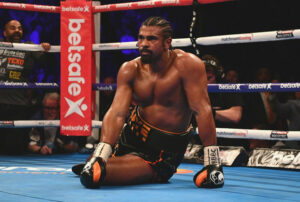
Haye has chosen the right time to bid farewell to the boxing ring, as he himself eloquently explains in his retirement statement, which is worth reading in its entirety.
His continued involvement in the sport as a promoter is to be warmly welcomed; boxing is well-served by having a man as talented as Haye on-board: one who has many alternative doors open for him.
For all that has been said and done in the past, right or wrong, his formal farewell to the sport is one full of honesty, humility and dignity. For this, and a terrific career, he deserves his dues.
Article by: Paul Lam
You can follow Paul on Twitter at: @PaulTheWallLam